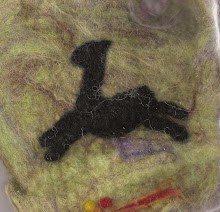
Though we have 7 wonderful vets at Kulshan Veterinary Clinic, Dr. Amber Itle is by far our favorite. She has never let us down. This past event with the ear infections that Eve suffered is an example. She is willing to go the extra mile and to try new procedures for us, always keeping in mind the expense.
When Eve was sick, she lost about 6 pounds in 15 days, which is extreme. So, we did a fecal exam and found she was loaded with parasites. Amber came by three days in a row to collect fecals and the difference is the count was amazing after treatment.
I had Amber write an article about this for the newsletter we put out for the North Sound Alpaca Association, and I copy it here:
According to the Journal of Animal Science, "stress" consists of external body forces that tend to displace homeostasis internally. There are environmental forces continuously acting upon animals that disrupt homeostasis, resulting in new adaptations which may be adequate for the animal to compensate, but may also cause disease. When we think of stress for an alpaca we may think of transport, exhibitions, being chased by dogs, shearing, or weaning. However, other stress may also appear as something less subtle such as poor nutrition, heavy parasitism, chronic lameness, or an infection. Over the last few months, we have been working with a 6 month old, bottle fed cria named, Eve. Eve presented two months ago with an ear droop, head shaking, and a low grade fever. She was treated for an ear infection with antibiotics and anti-inflammatories and seemed to make a full recovery, but then 8 weeks later, the symptoms were back. Although she was treated the same way, she was slow to respond and began to develop soft stool and lost weight. A fecal test revealed extremely high parasite counts when she was negative just 1 month before. It was a good reminder to all of us that even though we were focused on her infection, we didn't consider the impact the chronic "stress" the pain was having on her ability to deal with the parasites. Stress causes the animal to become immunocompromised and therefore more vulnerable to those "external forces", such as coccidia or stomach worms. After the treatment for the ear infection had a few days to work, Eve began to feel better and her parasite counts nearly returned to zero. The impact of stress is real, whether it's an infection or transport to breeding. Always remember to check for parasites during periods of stress as they are an opportunistic organism that will take advantage of any compromised alpaca and make their recovery more difficult.





I'm glad you have such good vets in your area....as I'd hate to see little Eve suffer any longer.
ReplyDelete